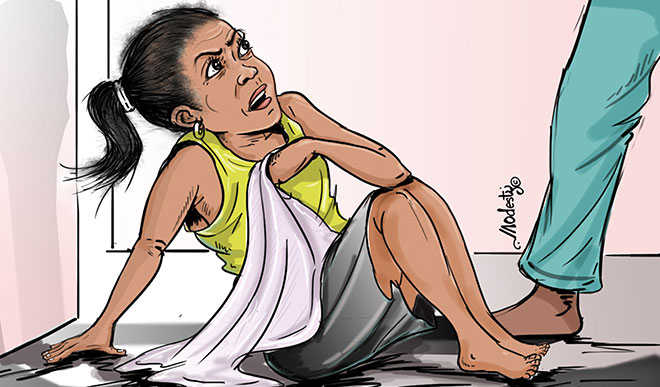
One of the main legislative issues that would engage the attention of the Senate when it resumes from recess is the concluding debate on the sexual harassment bill that has passed first and second reading.
Basically, the bill seeks to legislate against sexual harassment against female students by lecturers in all tertiary institutions in Nigeria. The menace of sexual harassment in schools has in no small way contributed in ensuring decrease in moral values among female students, albeit, the youths as well as declining quality and standard of education. This is because the lecturers who are the predators that engage in this act award frivolous academic grades in exchange for the satisfaction they derive from this immoral act. They equally frustrate the ladies who refuse their advances.
Sexual harassment in tertiary institutions cuts across board as female lecturers equally harass and intimidate some male students into sleeping with them. Either way, it affects negatively the moral values of students and in turn affect the moral values of the society at large.
The bill is not alien as there are other equivalent of it in other climes. For instance, the lead sponsor of the bill, Ovie Omo-Agege cited the example of the 603 year-old St. Andrews University in Scotland which recognises the negative impact of sexual relationship in the school and strictly abhorred it. In South Africa, under section 17 of the Employment of Educators Act of 1998 (as amended), it is an offence for an educator to have sexual relationship with a student, while in Australia (Queensland), the law forbids the student- educator relationship. The same is applicable in the United States of America as the Honour Code, Title 7 of the Civil Rights Act of 1964 and Title 9 of the Higher Education Amendments of 1972 abhors sexual relationship between an educator and student.
This is why it was seen as a welcome development when Senator Omo-Agege representing Delta Central senatorial district and 57 other senators sponsored this bill. Moving the motion for the second reading of the bill, Omo-Agege stated that the bill when passed into law will help check the menace of sexual harassment of students in Nigerian higher institutions.
The Bill which has passed its second reading by the Senate and sent to Committee on Judiciary, Human Rights and Legal Matters for further action is aimed at stopping the species of brazen sexual predatorship being unleashed on students and prospective students.
According to the Delta Central Senatorial District lawmaker, “This 8th Senate will be sending a very strong message that ‘enough is enough,’ that never again will our students be left at the mercy of the few sexual predators in our tertiary institutions. Nigerian students want us to act, now is the time to strengthen our laws against sexual harassment and compel heads of higher institutions to act to protect the victims. By removing mutual consent between a student and lecturers as a defence, this Bill, when enacted into law, will make such acts a statutory rape or a strict liability offence, thus offering better protection to students and make it easier to prosecute offenders.”
By offering protection, victims of this act would come out freely to lay complaints against such harassment and as such freely face their academic pursuit with ease. At the public hearing, presided over by Senator David Umaru, Chairman of the Senate Committee on Judiciary, Human Rights and Legal Matters, he explained that the Bill intended to criminalize the act of neglect or failure by administrative heads of tertiary institutions to address complaints of sexual harassment within a specified period. Furthermore, he said the purpose of the public hearing was to enable his Committee collate the opinions and suggestions of participants before making appropriate recommendations to Senate.
After the public Hearing, the following recommendations were made by various interest groups;
*That the title of the Bill should be amended to read “An Act to Make Provisions for the Prohibition of Sexual Harassment of Students Tertiary Educational Institutions, and for Other Matters Connected therewith“.
*That sexual harassment in the Bill should not be limited to educators but include all non-academic staff who have access to students
*That the stipulated fine for offenders should be increased from Two Million Naira as stated in Clause 15 to Ten Million Naira.
*That the Bill should give a time frame for the investigative Committee to act on reported cases of sexual harassment.
*That the Bill should create a time frame within which a student can report a complaint of sexual harassment after the alleged incident is deemed to have occurred.
While the Bill was largely commended, Mr. Biodun Ogunyemi, lecturer and President of the Academic Staff Union of Universities (ASUU) notably opposed the Bill which he described as “unwarranted, superfluous, and a waste of time”. Mr. Ogunyemi was also of the view that the Bill failed the test of fairness as it discriminated against educators and targeted male lecturers.
It is expected that the outcome and recommendations of the public hearing would be reflected in the Committee’s report to the Senate.
Though the bill is yet to be passed by the Senate, it has so far embolden some schools to commence actions against some lecturers accused of sexual harassment.
Last month, at the Delta state University, the Governing Council has approved the sack of six lecturers involved in sexual harassment related offence, while at the University of Ilorin, a lecturer who was caught on tape sexually harassing a female student was shown the way out of the school. All these are happening when the National Assembly is yet to pass the bill. What a way to curb the challenges of sexual immorality as well as shore up moral values at the nation’s tertiary schools.
Okocha is Special Assistant to the Senate President on Print Media

 Join Daily Trust WhatsApp Community For Quick Access To News and Happenings Around You.
Join Daily Trust WhatsApp Community For Quick Access To News and Happenings Around You.


